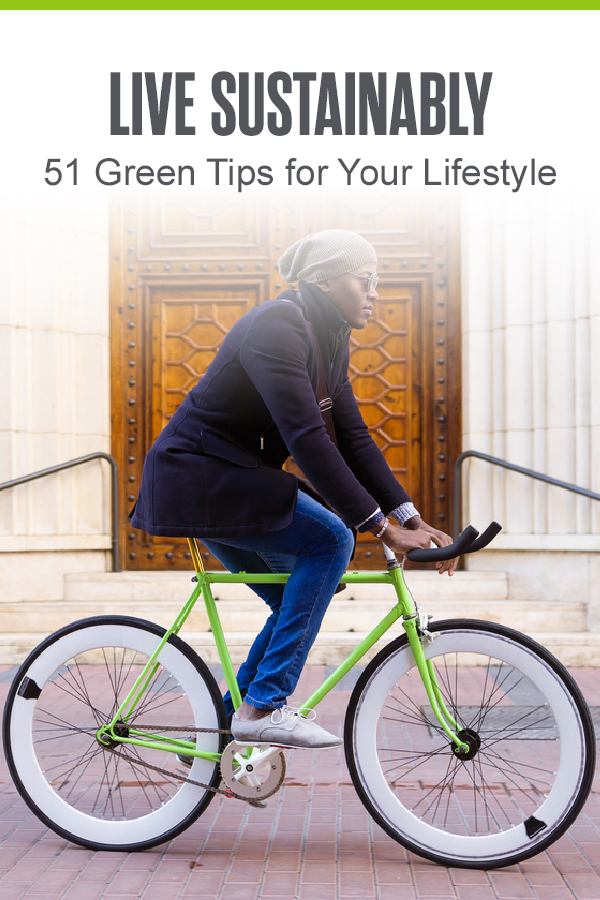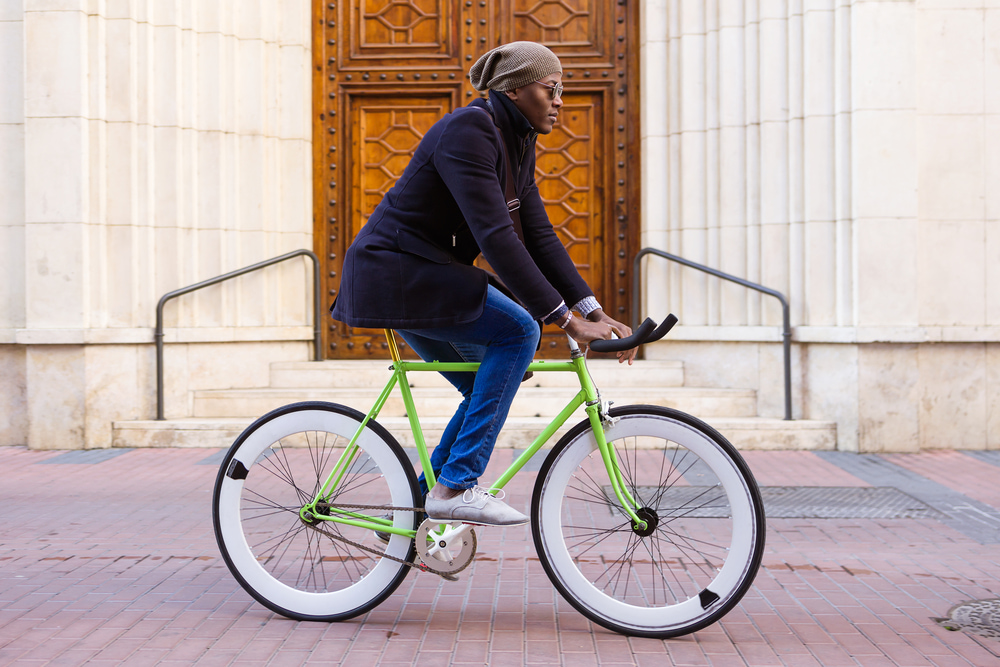Looking for ways to live more sustainably? Going green is a great way to reduce your environmental impact, save money, and improve your health. While living more sustainably may seem overwhelming at first, there are small strides you can take to live a more sustainable life. Here are a few environmentally-friendly ways to go green in everyday life!
- Sustainable Home Tips
- Sustainable Transport Tips
- Sustainable Shopping Tips
- Sustainable Food Tips
- Sustainable Beauty Tips
Sustainable Home Tips

Photo via @tappwater.co
- Replace light bulbs throughout your home with energy-efficient LEDs or CFLs, which can last up to 3-25 times longer than conventional bulbs.
- Save on energy bills by opening the blinds to help warm a room and closing them to cool it down.
- Invest in a smart thermostat that allows you to adjust the temperature in your home from your cell phone. Following this eco-friendly tip can save up to 12% on heating costs and 15% on air conditioning costs!
- Take shorter showers to save on water. Installing low-flow shower heads is another good way to go green.
- Turn the lights off when leaving a room and use natural light. During daylight hours, practice sustainability by using windows to let in natural light instead.
- Unplug appliances and other electronics when not in use. Even when turned off, these items still consume energy as long as they’re plugged in.
- Add plants to each room. Along with improving air quality, plants are a sustainable way to decorate.
- Make your own cleaners using natural ingredients. DIY household cleaners are not only easy to make, but they cost much less than store-bought products.
- Ditch paper towels and repurpose old clothing instead. Create sustainable, washable rags by tearing up shirts or other pieces of fabric.
- Save energy and get better air quality by changing your HVAC filter every 90 days.
- Wash laundry in cold water. Between 80-90% of the energy used in a typical wash cycle goes toward heating the water. Cut energy costs and move toward a greener lifestyle by sticking to the cold cycle.
- Go paperless! The average person receives 41 pounds of junk mail a year. Help save 100 million trees and nearly 30 billion gallons of water per year by opting for electronic document delivery.
- Collect scrap paper and reuse them when you can instead of always opting for a new sheet.
- Shut down your computer instead of leaving it on sleep.
- Use rechargeable batteries to cut down on waste.
- Be a more sustainable plant owner by collecting rainwater and use that to water your garden or house plants.
- Save gift wrap, gift bags, boxes, and ribbons and reuse them as much as possible.
Sustainable Commuting Tips

Photo via @peopleforbikes
- If your city has public transportation, utilize it! Taking public transit to work instead of driving isn’t just good for the environment. It can also help commuters save nearly $10,000 a year!
- Try bike commuting. Bicycling is a healthy and fuel-free way to avoid rush hour.
- Take the steps instead of the elevator. It gives you a great workout and avoids unnecessary electricity.
- Form a carpool group and alternate who drives each week. Carpooling just two times a week can save up to 1,600 pounds of greenhouse gas annually. Carpooling can also save drivers up to $600 a month in fuel and maintenance costs!
- If available, take advantage of flex hours at your office. Working from home is a great way to live a more sustainable lifestyle. It saves gas, cuts down on greenhouse gas emissions, and, as a bonus, eliminates time sitting in traffic.
- Consider upgrading or trading in your vehicle for a more environmentally-friendly hybrid model or an electric car.
Sustainable Shopping Tips

Photo via @walkablecharleston
- Choose reusable cloth bags over disposable plastic ones, which can take between 15 and 1,000 years to decompose! Buy a few reusable ones at the grocery store or take on an eco-friendly DIY project by making your own.
- Frequent your local farmers market. Buying local helps area farmers, stimulates the local economy, and minimizes the fuel utilized by supermarket trucks and planes that ship produce from around the world.
- Avoid buying plastic-wrapped items and bring your own containers when you shop, instead.
- Stop buying “fast fashion.” This term refers to cheap, trendy clothing that isn’t meant to last. The average American buys up to 80 pounds of clothing annually with over 85% being thrown away.
- Donate clothing to thrift stores, consignment shops, or shelters instead of throwing items away. Buying your clothing from secondhand shops is also an eco-friendly way to reduce waste.
- Keep an eye on labels. Purchase clothing brands that have a good track record of sustainability practices.
- Opt for a laptop instead of a large desktop, as laptops require less energy for operation. Laptops can also be recycled! TIA E-Cycling Central provides a list of state-by-state recycling options, and many Best Buy and Staples locations offer free recycling services. You should also make sure to recycle smartphones, tablets, and other devices!
- Avoid impulse purchases and honestly evaluate your needs before buying new things.
Sustainable Dining & Kitchen Tips

Photo via @pandabode
- Avoid using plastic straws when possible. Americans as a whole use nearly 500 million straws every day, which clog up oceans, choke plant and animal life, and can take up to 200 years to decompose. Opt for washable metal straws instead.
- Bring your lunch to work in reusable containers. Not only will preparing food at home save you money, but it will also save you from using takeaway containers.
- About 481.6 billion plastic water bottles are used worldwide in a single year, so skip the plastic ones and buy a reusable water bottle to cut down on waste.
- Try not to use plastic silverware. More than 100 million pieces of plastic forks, spoons, and knives are used each day in the U.S. Fight against waste and buy a set of reusable bamboo utensils instead.
- Save your food scraps and create a compost pile! This is a great way to be more sustainable and reduce methane gas buildup from landfills.
- Repurpose glass jars as storage containers or vases so they don’t wind up in a landfill.
- The next time you have a seafood craving, use Seafood Watch to choose an environmentally-friendly option. This resource teaches consumers about the importance of ocean conservation and helps consumers find sustainable seafood options at grocery stores and restaurants.
- Consume less meat and dairy. The production of both is responsible for 14.5% of the planet’s greenhouse gas emissions, and takes up half of Earth’s habitable surface. By choosing plant-based options over meat, you can reduce your carbon impact by 73% a year!
- Plant your own herb or container garden and enjoy fresh produce straight from your kitchen.
- Upgrade kitchen appliances like the oven, refrigerator, and dishwasher with ENERGY STAR certified models.
Sustainable Beauty Tips

Photo via @dwellwellcollective
- Make your hair routine more green by skipping the blow dryer and air-dry your hair instead. Though you might not realize it, even one hour of blow-drying your hair can take a lot of energy.
- If you use numerous cotton balls each day, cut down on waste and opt for washable, reusable cotton rounds instead.
- Make your own toothpaste from simple ingredients like baking soda, coconut oil, and essential oils.
- Some deodorants can contain less than eco-friendly ingredients like aluminum and irritating additives like perfume. Avoid these ingredients by making your own deodorant at home.
- Use eco-friendly makeup brushes that are made with bamboo or synthetic fibers. These brushes are easier to recycle and keep clean.
- Only wash your hair once or twice weekly. This sustainable habit not only helps keep your hair and scalp healthy, but it also cuts down on water use.
- Conventional nail polishes can contain abrasive ingredients like formaldehyde that are harmful to your health and the environment. Opt for eco-friendly nail polishes instead!
- Switch out shampoo bottles for a no-waste shampoo bar. These bars are travel-friendly, packed with natural ingredients, and can last up to 80 washes.
- Make your own face scrubs with natural materials like sugar, coconut oil, and essential oils. Some store-bought exfoliants and scrubs can contain microbeads that pollute waterways.
***
Need somewhere to store your belongings while you work on creating a more sustainable living space? Extra Space Storage has convenient storage facilities throughout the U.S. to meet your self storage needs. Rent storage space near you!




